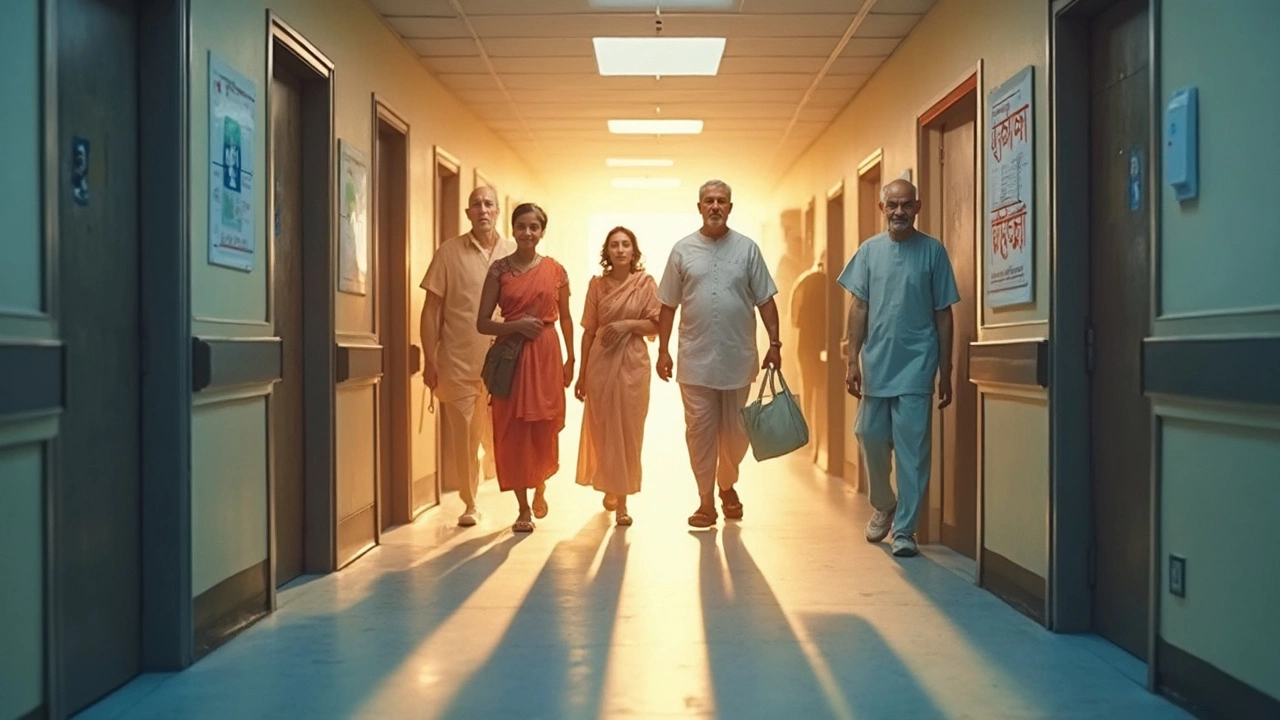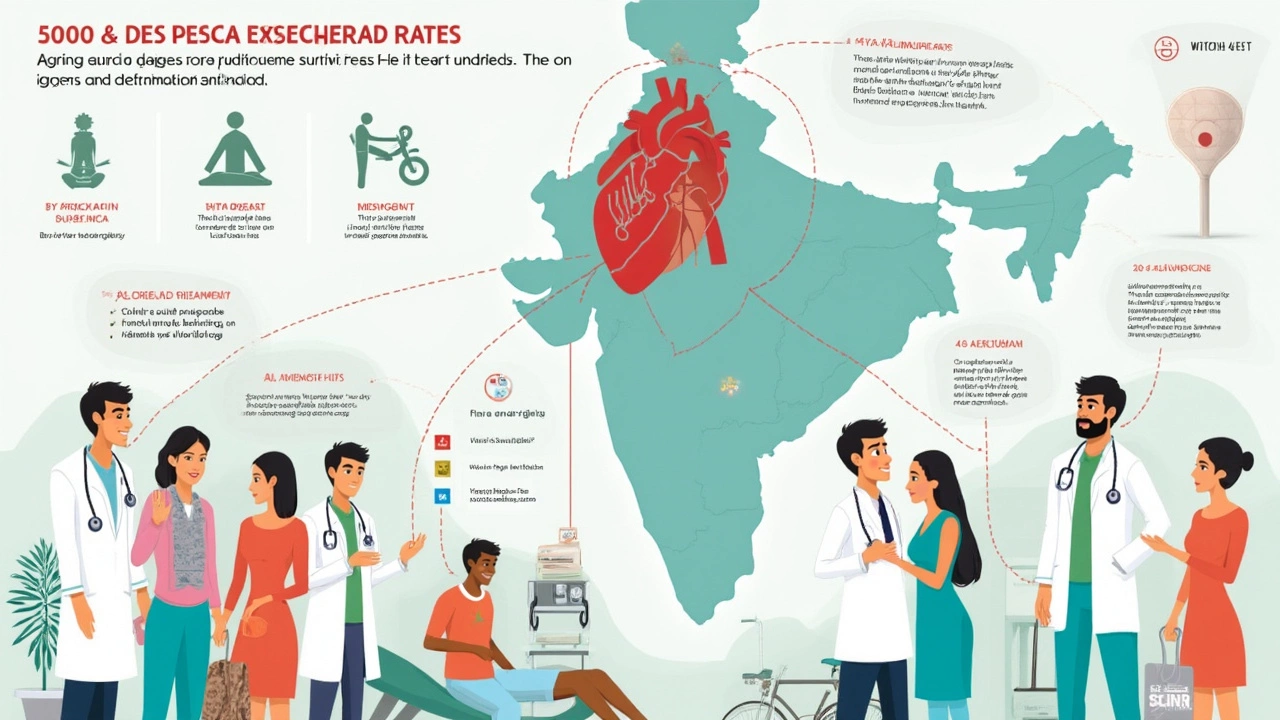It’s wild how people freeze up when they hear "open heart surgery." Most folks instantly picture a worst-case scenario, like something out of a medical drama. But the actual numbers paint a very different story—one that’s a whole lot less terrifying than pop culture lets on.
Here’s what’s real: survival rates for open heart surgery have shot way up in recent years. Procedures that once left everyone biting their nails now have solid stats behind them. Ask any heart surgeon and they’ll tell you: for most everyday patients, surviving open heart surgery isn’t rare at all. In fact, it’s pretty much expected when you look at the big picture.
Still, numbers don’t mean much when you’re the one facing the operating table. You wonder—what are your odds? What sets you up for a smooth ride versus a bumpy one? If you know the facts, it takes some of the edge off. So let’s break it down: how rare is it to survive open heart surgery—really? And what can you do to stack the deck in your favor?
- Survival Rates: The Real Numbers
- What Decides the Odds?
- Common Misconceptions
- Boosting Your Chances
- Life After Surgery
Survival Rates: The Real Numbers
Let’s talk numbers—because that’s what really matters when you’re wondering what your odds look like. Most people are surprised by how good the stats are. For example, if you’re having straightforward open heart surgery like a coronary artery bypass graft (CABG), studies from the American Heart Association show that survival rates are over 98% for people under 65 and about 95% for older adults. That’s more reassuring than anything you’ll hear on TV, right?
Here’s a quick look at survival rates after common open heart surgery procedures, according to 2024 hospital reports:
| Type of Surgery | Average Survival Rate |
|---|---|
| Coronary Artery Bypass Graft (CABG) | 98% (under 65), 95% (over 65) |
| Valve Replacement | 96% (aortic), 94% (mitral) |
| Complex or emergency open heart | 85% - 90% |
Sure, there are differences based on age and overall health, but for most people—especially those without a ton of other health issues—open heart surgery isn’t a roll of the dice. Actually, surgeons are usually more nervous about complications during recovery than survival on the operating table itself. In big centers that do a lot of these surgeries, some teams see less than 2% of patients not making it through.
One reason the numbers are so good: open heart procedures are planned, not rushed. The medical team checks everything before you even go under. That all adds up to more control and way better outcomes than emergency surgeries.
So, is it rare to survive open heart surgery? Honestly, unless you have some major underlying problems, most people walk out of the hospital and get back to life. The numbers back that up, and knowing them can help ease a lot of anxiety if you or someone you love is facing the OR.
What Decides the Odds?
The numbers don’t lie: open heart surgery is a major deal, but the odds aren’t random. Several straightforward things play into how likely you are to come through okay. Understanding the key factors can give you—and your family—a little more control over a stressful situation.
First, your age matters more than some folks expect. Younger people almost always bounce back faster. If you’re over 70, things get trickier, but millions of older adults get through heart surgery just fine every year. The next big player is your overall health. If you walk Simba the cat every day and keep active, that’s huge for your recovery chances. But conditions like diabetes, kidney issues, or other chronic illnesses can make things riskier.
Experience counts, too. Surgeons who do a ton of heart surgeries every year usually get better results. You’ll want to be at a hospital with a dedicated cardiac team. It’s also worth checking their infection rates—they vary more than people think.
- Heart surgery survival rates can change a lot based on the procedure type. Bypass surgeries, valve replacements, and repairs all have slightly different risks.
- Emergencies are always tougher. Planned, routine heart surgeries have the highest survival rates.
- Weight, smoking history, and even sleep habits add up, so tackling those before surgery gives your body a serious boost.
Just to give you a clearer picture, check out real mortality rates for common open heart procedures in the table below. (These are estimates based on recent hospital data from North America.)
| Procedure | Average Mortality Rate |
|---|---|
| Coronary Artery Bypass Grafting (CABG) | 2% - 3% |
| Aortic Valve Replacement | 2% - 5% |
| Mitral Valve Replacement/Repair | 3% - 7% |
| Emergency Open Heart Surgery | 5% - 15% |
So, the short version? Most people survive open heart surgery, especially when their health is stable, the doctor’s done it a hundred times before, and the surgery is planned. Take care of your body, ask about your surgical team’s track record, and you’re putting yourself in the best spot possible.

Common Misconceptions
If you search online or talk to folks in the waiting room, you’ll probably hear a handful of myths about open heart surgery. They sound scary, but most of them don’t hold up when you look at the facts.
The biggest misconception is that open heart surgery is a shot in the dark. People often assume the risk of not making it is super high, like flipping a coin. Here’s what’s real: for most common procedures like a coronary artery bypass, survival rates in major hospitals are around 97 to 99%. So, the chance of dying during open heart surgery is actually pretty low—way lower than the drama you see on TV.
Another myth is that only old or very sick people need this kind of surgery. That’s not true either. Some folks in their 30s or 40s go in for valve repairs or to fix a genetic issue. Age and overall health matter, sure, but they’re not the only things doctors look at.
You might also hear whispers that life afterwards will never get back to normal—that you’ll be weak forever or never do normal stuff again. But most people are up and moving within days, and able to get back to a regular routine with a few sensible tweaks. Recovery isn’t a straight line, but it isn’t a black hole either.
- Myth: Recovery takes years. Reality: Most people are back to daily life within weeks or a few months.
- Myth: Every open heart surgery is an emergency. Reality: Most are scheduled, planned, and very controlled.
- Myth: If you’ve had other health problems, you won’t survive. Reality: Doctors tailor plans to your situation, and plenty of people with diabetes or high blood pressure do just fine.
If your Uncle Raj or your coworker passes along one of these scary stories, double-check with your doctor. Surgeons and nurses have seen it all, and they know what’s real versus what’s just hospital gossip.
Boosting Your Chances
If you want the best shot at coming through open heart surgery strong, there’s plenty you can do—both before and after the big day. Putting in work ahead of time shifts the odds even more in your favor. The first thing? Be real with your surgical and health team about your medical history, lifestyle, any meds or supplements, and stuff like allergies. Surgeons and nurses aren’t just nosy; they use this info to avoid surprises when you’re on the table.
Studies keep showing that patients who follow their pre-op guidelines do better. Simple things—like quitting smoking, getting blood sugar under control if you’re diabetic, or even doing short daily walks—help your body deal with the stress of surgery. Here’s a quick rundown of steps that matter:
- Quit smoking several weeks before surgery.
- Stick to your pre-op nutrition plan, especially if your doctor mentions cutting salt or certain foods.
- Control blood pressure and blood sugar if you’re dealing with hypertension or diabetes.
- Take prescribed medications exactly as instructed, and ask before stopping anything.
- Get any needed vaccines, like flu or pneumonia shots, if your team brings it up.
- Handle infections fast—don’t ignore stuff like dental pain or signs of a cold before surgery.
- Keep moving (light exercise is almost always good unless your doctor says otherwise).
Your job isn’t over just because you’ve survived the OR. Following post-op instructions gives your heart and chest the best shot at healing without hiccups. Hospitals even track how much faster recovery happens when people stick to the drill: deep breathing exercises, using the incentive spirometer they hand you, walking in the halls, eating right, and keeping wounds clean.
Take a look at these numbers from recent studies in the US—it shows how much survival jumps with good prep:
| Preparation | Survival Rate (%) |
|---|---|
| Excellent pre- & post-op care | 98-99 |
| Average pre- & post-op care | 96 |
| Poor prep or complications | 89 |
Here’s a little tip from folks on the recovery side: set alarms on your phone for pills and walks, keep a daily log of how you feel, and don’t downplay weird symptoms—even those "probably nothing" fevers or chest pains. A quick call to your doctor can be a lifesaver (literally), and nearly every cardiac team prefers you ask a "dumb" question than stay silent.

Life After Surgery
So you’ve made it through the big day—now what? A lot of people think life just goes back to normal straight away, but it’s more like learning a new routine. That first week or two is usually the toughest. Your chest is sore, energy is low, and you’re probably wondering if you’ll ever get back to yourself.
The truth is, bouncing back after open heart surgery takes patience. You might spend five to seven days in the hospital. Walking a few steps, showering, even eating might need help at first. But it’s not forever—most people can slowly increase activity and return to everyday stuff after about six to eight weeks. Want to see what happens on the road back? Here’s what doctors, nurses, and people who’ve had the surgery say matters most:
- Daily Movement: Short walks are key. Don’t try to be a superhero, just keep moving and let your body guide you.
- Follow Instructions: Your surgeon gives you rules for a reason—stick to activity limits and meds, even when you feel better.
- Watch for Red Flags: Call your doctor if you have chest pain, trouble breathing, fever, or swelling. Don’t try to tough it out.
- Good Food Choices: Focus on heart-healthy meals: more veggies, less salt, and lean protein. It does help.
- Check-in Appointments: Don’t skip these. They track your healing, catch problems early, and let you ask anything.
Staying positive makes a difference, too. It’s normal to feel down sometimes—mood swings, frustration, and even the blues are common for a month or two. Reach out to friends, family, or a pro if you’re stuck. Simba (my cat) personally thinks naps help—it’s not a joke, sleep really does heal!
If you like clear numbers, here’s a snapshot from recent studies on recovery milestones after common heart surgeries:
| Recovery Milestone | Average Time |
|---|---|
| Walking unaided | 7 to 14 days |
| Back to work (desk job) | 6 to 8 weeks |
| Driving again | About 6 weeks |
| Full recovery | 2 to 3 months |
A lot of folks end up feeling better than before surgery. You just need solid support, reliable info, and a little patience. Your "new normal" might have a few more doctor’s visits, better eating habits, and maybe a cat or two cheering you on. That’s not so bad, right?
